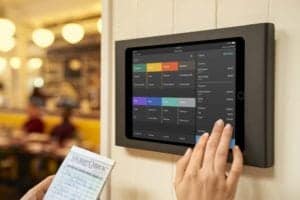If you use Clover Flex, Mini, or Station, you’ll have a built-in loyalty program at no additional cost. Clover’s loyalty program allows you to store customer information, track spending habits, create and send custom promos, and get feedback from your customers. Customers can also use a mobile app to track reward points.
Square also has a loyalty program. However, you must be on a paid plan to have this feature.
Clover makes it easy to manage your employees with features such as scheduling, shift management, customizable tips, tip pooling, customizable employee access, and performance metrics.
Square Team Management is free for all plans and has scheduling, a time clock, break tracking, and the Square Team app. Users can upgrade to Team Plus for an additional monthly fee, which has more advanced features, such as open shift scheduling, shift swapping, team reminders, customizable access levels, and reports and analytics.
All of Clover’s software plans feature inventory management, although you will need to purchase a more expensive plan to access advanced inventory. Some of the features you can expect from Clover include variants, labeling, item tracking, and modifiers. Inventory can be managed across multiple locations.
Square has similar inventory management features. For the most advanced features, you will need to invest in the Premium plan. Some of Square’s inventory management features include transfers across multiple locations, bulk importing, real-time tracking, variants, and daily stock alerts.











